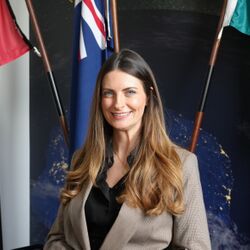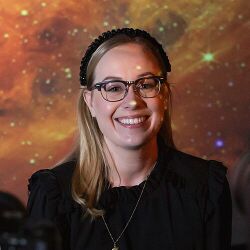Sharing space: how satellite constellations and astronomy can co-exist
Day: Thursday 2 October
Time: 14:55 - 15:50 AEST
Location: Parkside 2
The boom in satellite technology has brought previously unimagined advances, bringing the internet to remote and under-served areas of the world and enabling economic growth and community benefits. However, the growth in satellites in low Earth orbit has brought new challenges to astronomy, one of humanity’s oldest sciences.
Ground-based telescopes, in both optical and radio frequencies, are exquisitely sensitive instruments, allowing them to detect the faintest signals that have travelled for billions of years across space. These billion-dollar ground-based telescopes include Europe’s Extremely Large Telescope, under construction in Chile; the SKA radio telescopes being built in South Africa and Australia; and the US’s extremely large telescopes planned for Hawaii and Chile. They too aim to transform humanity – revolutionizing our understanding of the Universe, delivering benefits that will impact society and improve lives, and progressing human knowledge.
Satellite constellation providers have been engaging with astronomers to mitigate the effects of satellites on astronomy observations, and deliver the cutting-edge science promised by these new instruments. For optical telescopes, this focuses on reducing the reflectivity of the satellites. Satellite constellations can interfere with ground-based astronomy. For radio telescopes, mitigations include momentarily turning off intentional transmissions or steering beams away from radio sensitive facilities. A more subtle effect arises from ‘unintended emissions’ from the electronics in the satellites, with early investigations ongoing between astronomers and the satellite industry.
In this panel session, representatives from astronomy facilities and the space industry will discuss how they are collaborating to sustainably share the sky, so that humanity can reap the benefits that satellite constellations bring, while continuing its ancient quest to understand our Universe.
Moderator
Speakers

Philip DIAMOND
Director-General, Square Kilometre Array Observatory (SKAO)
United Kingdom





